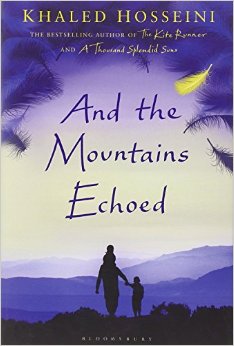I broke a promise I made to myself, a promise I had kept for 9 long years. I was not going to read another of Khaled Hosseini’s books after the heart-wrenching story of the Kite runner although I loved every bit of it. I did duly skip A Thousand Splendid Suns and stayed true to the promise, until a friend, unaware of this promise of mine gifted me Hosseni’s latest bestseller And the Mountains Echoed
. So I made my choice, picked the book to read during a bus journey in the night and here is how beautifully Hosseini opens the book for me.
He says “So then. You want a story and I will tell you one. But just the one. Don’t either of you ask me for more. It’s late and we have a long day of travel ahead of us.” Few pages turned and I knew he too broke his promise , because it was not just one story. No, the book is not a collection of short stories, but it definitely is not just one story. The rest of the night saw me holding my mobile flashlight on and burying myself into the book much to the annoyance of my fellow traveler.
The story begins in the fall of 1952, Shadbagh, Afghanistan and takes you to places across continents for a long period of time tracing the lives of Abdulla, the loving brother and Pari, his dearest sister. What begins as a tale of Abdullah and Pari hardly continues to be their story anymore. As their step-uncle Nabi would say later it becomes “a myriad of consequences” of an action that was set into motion and the way it affects the lives of the people around them. Hosseini is indeed a master storyteller, but what amazes me is the way he does justice to all his characters. He allows you to judge his characters and eventually shows you how wrong you can be with your judgments. For once, I am completely made to believe that all is fair in love.
The book talks in depth about the strength of the bond that one shares with family, friends and beyond, the significance of the choices that we make,the regrets of deeds done and undone and more. Yet one cannot miss the subtle portrayal of the miseries of a war-torn state, the illusions of a liberal state, misgivings of the various generations, the pain of poverty, the ordeals of living and the desperations of the society as a whole. I envy Hosseini’s gift to tell profound, powerfully haunting tales with astonishingly simple words. Hosseini says through Odie, “It’s a funny thing Markos, but people mostly have it backward. They think they live by what they want. But really what guides them is what they are afraid of. What they don’t want.” I can’t begin to explain the effect these words had on me.
I’m very sure not everyone will enjoy the incoherence in his style of story-telling. If you are one of those who prefer a steady stream of thoughts and hate connecting the dots to complete the picture, then you might feel like closing the book after few chapters. And if you are one of those who had also read the other books of the author you might start to feel that the picture of Afghanistan, Kabul, the Taliban, the plight of women in the country and the story of the tragic lives is getting monotonous. But then as Hosseini says “Kabul is… a thousand tragedies per square mile.” Someone must keep excavating these long buried tales and sing them out loud to the world.
I must warn you that your heart will still ache and you might end up weeping endlessly into the night, yet here is something different from the Kite Runner. In this book, he does show you a way to find solace; solace not just from the pain he inflicts through his stories but also from your own despairs, only if you can see it.
The book is indeed an emotional roller coaster. I suggest you to take the ride even if you dread it, because like all roller coaster rides you do feel very alive when it finally ends.You might even learn the game of purging bad dreams and gifting good ones, just like Abdullah and Pari.


